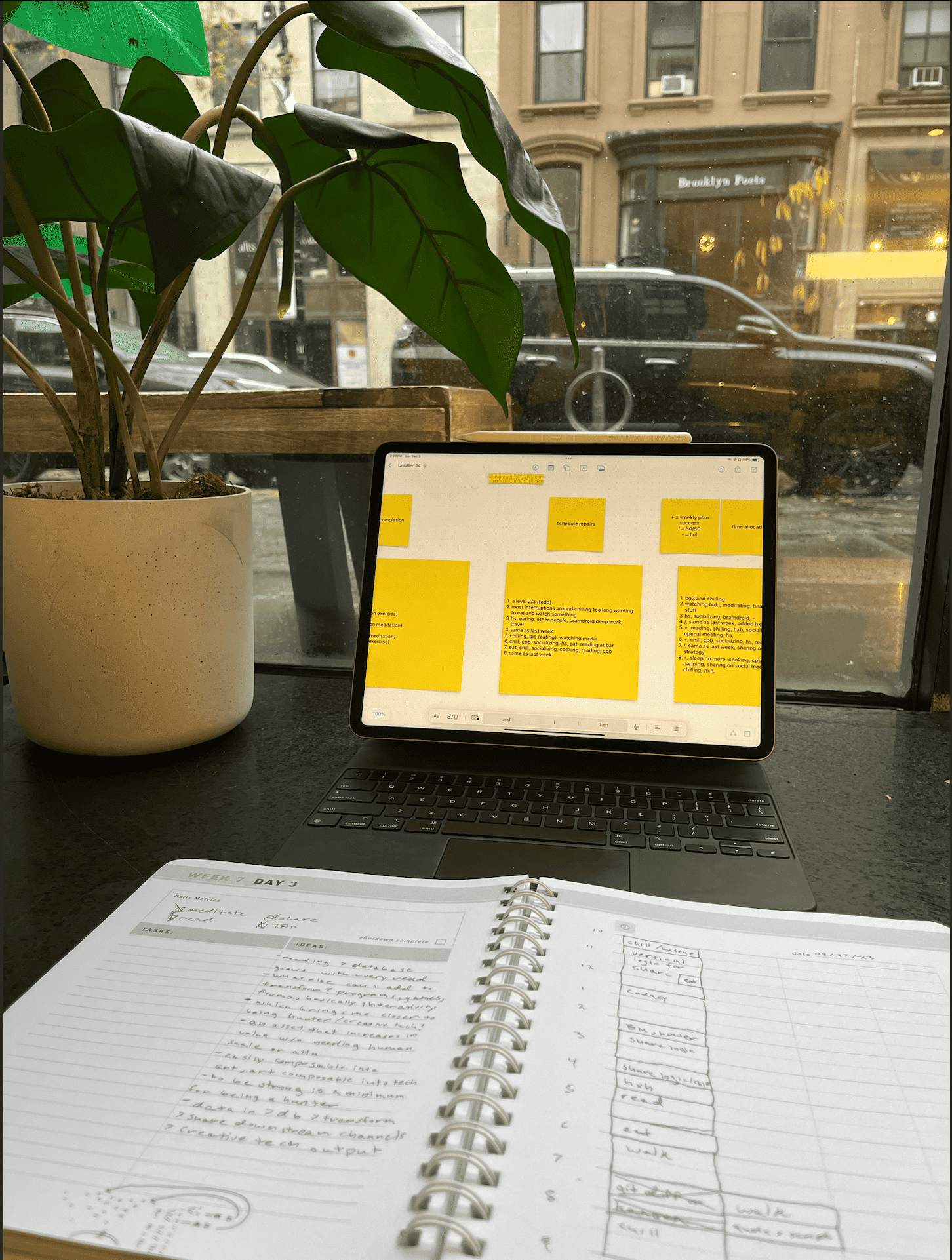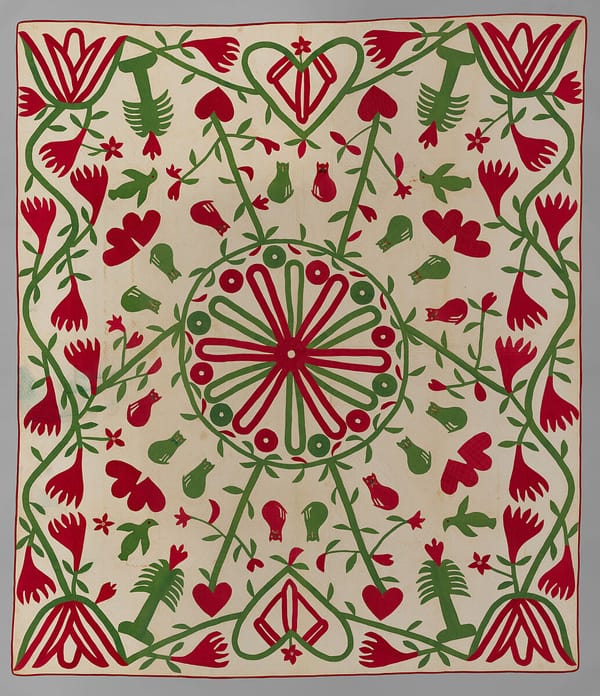Issue 37: Sixteen Weeks of Time Blocking
When you hold the sand from a broken hourglass in your hands, it's just sand.

Food For Thought
This week, I finished my first time block planner, cover to cover. Sixteen weeks of time blocking. To celebrate/mourn this bittersweet accomplishment, I sat in a cafe in Brooklyn and conducted a detailed reflection on how I (mis)managed my time since I've been time blocking (see picture above). This experience was nothing if not...humbling. And not in a good way. But a necessary way. Let me explain.
First, let's discuss the journal itself. I love this journal. I've never been much of a calendar person; my handwriting is terrible and I'm a pretty cracked coder, so I've always preferred digital tools over analogue. As such, I was stuck trying to finagle Google Calendar/iCal to my specs, and I've written any number of libraries myself to create a working solution. None have really worked, and so my calendar was relegated to Google Meet/Zoom meetings and my daily, oh-so-daily goals were spread out over Trello, Obsidian, GitHub, and wherever else I might put them. This working style, well...wasn't working. I needed a solution that was equal parts pragmatic and helpful.
There's just something special about this journal. The calendar repair feature is the main advantage of time blocking, and its elegance is tantamount throughout. With four columns, the goal of time blocking is to intentionally plan your day and roll with the punches. The first column is your ideal schedule. But life happens. Life always happens. So columns two, three, and four are for repairs. After an interruption, the idea is to regain control as soon as possible over the rest of the day. Seen in this way, unplanned life events function as turbulence on a way to a specified goal state for the day, and as pilot, it is your duty to get the plane to an altitude where the turbulence is absent. The turbulent event itself happened, you just responded to it. This is key. The time block planner is a dose of reality other calendar apps just refuse to account for. In iCal for example, I can only say yes/no/maybe to an event. What the heck do those statuses mean? What if a meeting or a work block goes over? Under? Priority shifts halfway through? There is no room for adaptation, merely fulfillment of someone else's time.
And in a todo list, the opposite problem is present. I can only see what I want to accomplish, not what actually is happening. There is no way to know how long a task will actually take in reality, "getting milk" at the store could take decades (just ask my dad!). So a todo list is the equivalent of a optimist who puts their fingers in their ears and shouts la-la-la-la whenever they hear any bad news. The list must be completed, no matter the cost, it says!
So it's safe to say that I really, really, really, recommend this planner, and if you subscribe to this newsletter and consistently read these issues, you are most likely the type of person who would benefit from having such a thing, so, pick yourself up one, and thank me later (affiliate link).
Ok, on to my retrospective.
Let's get the ends of the 16-weeks out of the way first, as psychologists everywhere have noted that people have a strong bias towards the beginning and end of things (movies, books, relationships, etc.). Laying the groundwork for the ends of the journal will help illuminate the middle.
In the first weeks (weeks 1-2) I see in my planner that I seem to be going through a "honeymoon phase" of sorts. I was trying hard, very, very, hard to stay on target, to fulfill all of my metrics, and to walk the ideal path I set for myself. This was a time when my motivation was high, but it was propped up by a baseless excitement, a energy that would eventually have to run out.
In the last weeks (weeks 15-16), I'm much more on "autopilot". I seem to have gotten really good at some things, and have also developed some pretty gnarly habits that I had left festering from early weeks. This means that I never really became more "zoned in", I simply became a more effective version of who I already was.
So how did I transition from zealous completionist to time-block-zen-master-with-a-pile-of-dirty-laundry-under-the-bed? Let's dive in.
Running a "linear regression" of sorts over my planner, I noticed a number of trends about myself. Rhythms that I subconsciously developed, not visible in isolation, but strikingly clear in aggregate. Much of the "turbulence" I faced daily came in three flavors: meandering on calls, the bait-n-switch, and "just five more minutes".
Let's start with meandering. Meandering means basically lounging, or over-staying a welcome. Meandering seems harmless, but in fact, it caused major disruptions to my schedule downstream. The hard part about this is that the people I meander with on the phone are people that I really like. To address this in my next 16-week planner, I plan to schedule calls with the people I like, and put an end time on these calls because I value their time and mine. In addition, I would like to do higher quality activities in favor of quantity. A shared memory is worth its weight in gold.
The bait-n-switch is when I would plan to accomplish a task, but because of my environment I get context switched into another task that is more appealing. This was most apparent through my meditation habit. Even when scheduled, I would resist the task when it was written and replace it with often something more difficult, like opening up Cursor and writing some code or going live on Twitch. Other times, I would also just context switch to "chilling watching YouTube videos until I get bored". No bueno. This would consistently result in a phenomenon called revenge bedtime procrastination, where I would stay up late trying to squeeze in the habits I neglected earlier in the day. To address this in my next 16-week planner, I plan on just getting my metrics out of the way first thing in the morning. The morning has the obvious virtue of being the literal opposite of the night, and more importantly, mornings are quieter, and the mind is not yet set on any particular task, making it a prime time to do well,...a morning routine. My hope is that the initial difficulty and resistance of this new routine will be quickly offset by the value add of getting my affairs in order. I've written in a previous issue that I operate very top-heavy, which is not sustainable, admirable, or even feasible. This 16-week cycle, I will get my house in order, even at the cost of other areas of my life, simply because the alternative is untenable.
Finally we have the "just five more minutes" phenomenon, which is when I would go over on something I'm currently doing and keep doing that thing instead of moving on to the next block. This would happen particularly when watching Netflix, or when in the middle of an interesting coding problem. To address this in my next planner, I intend to create a simple txt file that says where I left off with the block I am on. The idea is to leave an item in a state where when I pick it up later, it is trivial to context switch back into the mode I need to be in.
These three problems, and their recurrence, were only revealed to me after the fact, after the planning and the living and the logging of the time itself. I never would have noticed these trends from the tangent I live on. My compass was seemingly always pointing north. Even if in reality, it was broken! The metric tracking, the calendar repairs, the weekly plans all worked together to help me learn new things about myself, to give myself a conversational framework with my own desires, fears, greed, and motivations.
This opens up a deeper point...
The value of reflection is that we are mortal creatures. If I had no internal clock to live, and more importantly to intentionally act, time blocking would be a meaningless gesture. We fleshy humans are the sum of our attention. What we measure is what we manage. The purpose of tasks like these is not to chastise, or to over correct, but to create a life we are proud of. One we enjoy paying attention to. A quote I live by: "You must choose a philosophy, or one will be chosen for you." The same can be said about both your attention and your time. Play an active role in yourself, because no one else will.
And that is why we time block.
On My Nightstand - What I'm Reading
This newsletter issue is much too long already, so I won't add commentary to the quotes below, but hopefully they inspire you as they do me about the criticality of time management, despite its hopelessness.
Human felicity is produced not so much by great pieces of good fortune that seldom happen, as by little advantages that occur every day.
-- The Autobiography of Benjamin Franklin (AmazonClassics Edition) (affiliate link)
Habits are the compound interest of self-improvement. The same way that money multiplies through compound interest, the effects of your habits multiply as you repeat them. They seem to make little difference on any given day and yet the impact they deliver over the months and years can be enormous. It is only when looking back two, five, or perhaps ten years later that the value of good habits and the cost of bad ones becomes strikingly apparent.
-- Atomic Habits: An Easy & Proven Way to Build Good Habits & Break Bad Ones (affiliate link)
First, schedule a chunk of time for everything that is important to you; this is called “time blocking” or “time boxing.” If you truly value being healthy and have decided that a 30-minute daily workout is your enabling goal, then don’t put it on your to-do list—put it on your calendar. Schedule it as a recurring appointment. If you value customer intimacy as a business strategy and have an enabling goal of talking to at least two customers a day, then schedule a daily appointment for “customer calls.”
To build your working life around the experience of flow produced by deep work is a proven path to deep satisfaction.
-- Deep Work: Rules for Focused Success in a Distracted World (affiliate link)
But to describe attention as a “resource” is to subtly misconstrue its centrality in our lives. Most other resources on which we rely as individuals—such as food, money, and electricity—are things that facilitate life, and in some cases it’s possible to live without them, at least for a while. Attention, on the other hand, just is life: your experience of being alive consists of nothing other than the sum of everything to which you pay attention. At the end of your life, looking back, whatever compelled your attention from moment to moment is simply what your life will have been. So when you pay attention to something you don’t especially value, it’s not an exaggeration to say that you’re paying with your life.
-- Four Thousand Weeks: Time Management for Mortals (affiliate link)
paradox of limitation, which runs through everything that follows: the more you try to manage your time with the goal of achieving a feeling of total control, and freedom from the inevitable constraints of being human, the more stressful, empty, and frustrating life gets.
-- Four Thousand Weeks: Time Management for Mortals (affiliate link)
Thanks for reading, and see you next Sunday!
ars longa, vita brevis,
Bram
P.S. If you like what you read on this newsletter, forward it to a friend! It really helps!




